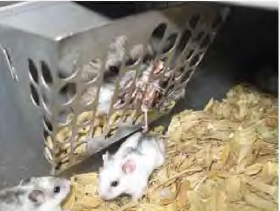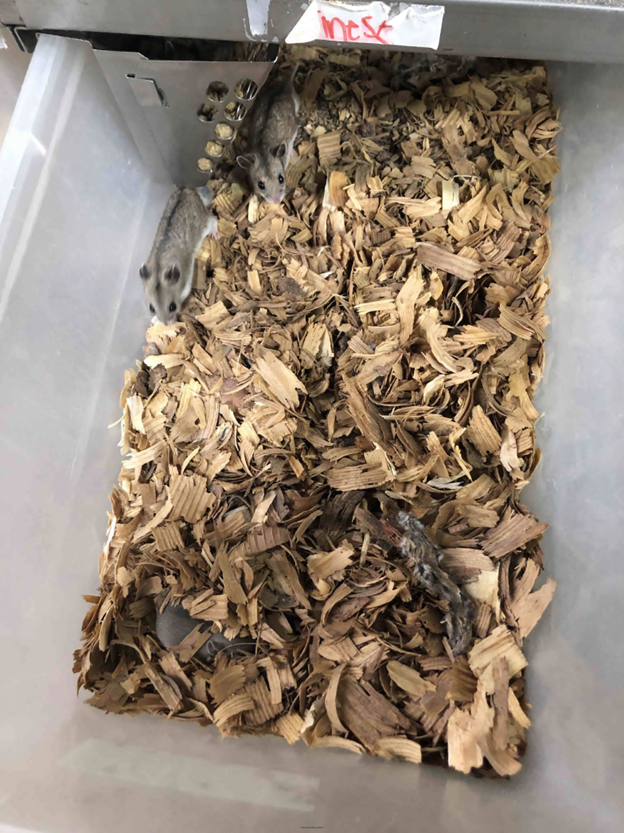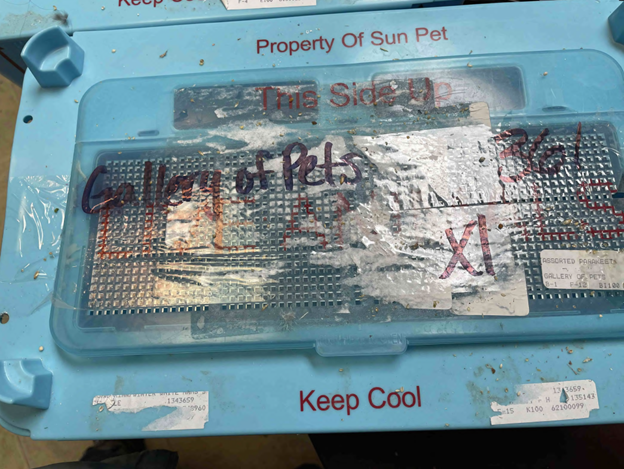
Animals sold in pet stores like PetSmart and Petco come from cruel mills and animal dealers like Sun Pet Ltd. where animals endure systemic neglect.
Cannibalism, Illness, and Dead Animals Found at Sun Pet
Please be advised this blog includes graphic imagery.
US Department of Agriculture (USDA) inspectors have uncovered horrific suffering at Sun Pet, one of the biggest animal dealers in the country. Sun Pet buys small mammals, fishes, reptiles, and birds from breeding mills, ships them to a Sun Pet facility, and then sells them to pet stores, including PetSmart and Petco.
In a single inspection, USDA inspectors observed a hamster with an “excessively swollen red right eye” that they couldn’t open, underweight hamsters, and hamsters with wet tail (“wet tail” refers to diarrhea in hamsters and is often fatal if untreated). A female hamster was found lying on her side, not moving, while another was found at the back of the enclosure “with a mostly hairless face with reddened and crusty skin underneath.”
Tragically, cannibalism was documented in 22 hamster enclosures. The inspector wrote, “One enclosure had a hamster that was actively being cannibalized while…still alive.” Multiple enclosures had pieces of deceased hamsters mixed in with living hamsters. Some deceased hamster pieces were found in the feed bin and bedding material.

Image: A cannibalized hamster in a feed bin at Sun Pet.

Image: A dead hamster with living hamsters in an enclosure at Sun Pet.
The inspection also documented a female rabbit held alone in an enclosure with a respiratory illness “with yellow nasal discharge and yellow crust present around her eye,” 10 unhealthy-looking gerbils unable to reach their water dispenser, hamster enclosures with cracks large enough for a hamster to escape through or injure themselves, spilled food covered with green fuzz, and rodent corpses near the area where food was stored.
Despite the severity of legal violations and the number of animals involved, Sun Pet was given a measly $4,500 fine by the USDA. A fine that low isn’t a real penalty to a company the size of Sun Pet, it’s just another business cost.
The Deadly Journey from Dealer to Pet Store
Even if animals survive a place like Sun Pet, the danger is far from over. Animals are packed in crates and boxes and shipped to pet stores hundreds or even thousands of miles away. Some of them don’t survive the trip. For example, a USDA veterinary medical officer emailed the USDA veterinarians who inspect Sun Pet warning them that Sun Pet was sending sick and dead hamsters and rabbits to a store in Texas. The store had asked Sun Pet to send fewer animals, but Sun Pet ignored the request.
Two years earlier, the same officer emailed USDA inspectors saying she received complaints from a pet store that they were receiving rabbits from Sun Pet that appeared overheated. The store said that “usually a few [rabbits] will die the next day.”

Image: Sun Pet ships animals to pet stores in plastic carriers and cardboard enclosures. In this photo, the ventilation holes have tape over them, leaving the animals at risk of suffocation.

Image: A shipment of hamsters from Sun Pet stacked seven boxes high and four boxes deep. The hamsters stuck in the middle cannot even be observed during transport.
It’s impossible to know how many animals arrive dead. Neither the federal government nor most states regulate pet stores unless they’re selling rarer animals like nonhuman primates.
For stores like PetSmart and Petco, countless animal deaths go unreported. But employees continue to speak out about the animals suffering in stores. Popular Reddit threads for Petco and PetSmart employees contain dozens of posts about animals who arrive sick or dead or later die at the store. During last summer’s intense heatwave, a Petco employee posted that they received a shipment of reptiles and fishes where half “were passed away. We had about a handful of small animals pass as well. The betta cups were TRAGIC. It just became too much in that moment. Me and my coworker just cried.”
Ban the Sale of Animals in Pet Stores
Washington, DC and Cambridge, Massachusetts ban the retail sale of mammals, birds, amphibians, reptiles, and arachnids (unfortunately, both laws exclude fishes). Both Boston and New York City have passed bans on the sale of guinea pigs and 11 other cities have passed ordinances prohibiting certain species of animals from being sold in stores.
Could your city be next? Download our toolkit which breaks down how to pass a ban on the sale of animals in pet stores.